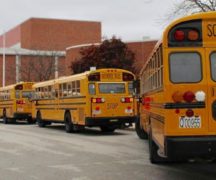The new state budget allocates billions of dollars to necessary public services, but you have to flip to page 1,326 to find the part about buying to-go cocktails.
Tucked between groundbreaking investments in broadband internet and children’s services, this provision lets Ohioans purchase drinks for “off-premises consumption,” so long as the drink is not any more alcoholic than what is normally served there.
When it comes to the two-year, $74 billion state budget, which stretches a full 2,438 pages long, there are plenty of obscure items like the to-go cocktails. Besides allocating state resources to schools, infrastructure and other public needs, the budget serves as a catch-all for an endless array of policy changes.
In many of these cases, the changes have seemingly no fiscal impact on state government whatsoever. One example includes the budget altering the title of “Deputy Auditor of State” to “Chief Deputy Auditor of State.”
Nonetheless, some of these obscure budget items may still have an impact on your life:
Copy that. Going forward, public libraries are required to provide Ohioans with free photocopies of their driver’s licenses, learning permits or other state identification cards. State Library Board, Page 1,108.

That plate is history. The budget removes the Ohio Geology license plate, the proceeds of which went toward geology research and educational materials in Ohio schools. (For what it’s worth, the plate isn’t even currently issued by the Bureau of Motor Vehicles.) Department of Natural Resources, Pages 440-441.
Cut above the rest? Ohioans have to pass an exam to teach at a barber school. Failing the exam has meant having to wait one year before trying again, but the budget removes that waiting period. Cosmetology and Barber Board, Page 1,400.
Answered prayer. It is normally illegal to bring alcohol into a prison. The budget provides an exemption for religious figures bringing in “small amounts of sacramental wine” for inmates to consume. Department of Rehabilitation and Correction, Page 625.
Party like it’s 1776. The year 2026 will mark 250 years since the Declaration of Independence, and the new Ohio Commission for U.S. Semiquincentennial will plan ahead for the festivities. The 30-member commission has until September 2022 to submit a report of detailed ideas to the governor. Ohio History Connection, Page 265-268.
Bingo! Bingo! The word “bingo” shows up in the budget bill a grand total of 685 times. First is a provision legalizing charitable electronic bingo at fraternal and veteran’s halls. The budget also removes a prohibition against selling alcohol during bingo games. One other obscure provision deals with “youth athletic park organizations.” Currently, playing fields maintained by these organizations must be in use for at least 100 days in a given year in order for the organization to obtain a bingo license. The budget takes out this 100-day-per-year requirement. Attorney General & Liquor Control Commission, numerous pages throughout budget.
Tiresome. Property owners currently can have up to 5,000 scrap tires removed from their land for free, so long as the owner is not at fault for the tires being there in the first place. The budget increases this tire abatement program to 10,000 scrap tires. Environmental Protection Agency, Page 1,160.
Pay your debts. When a person wins $5,000 or more in the lottery, the state withholds any money they happens to owe in unpaid taxes. The budget reduces this withholding threshold down to just $600 for lottery and casino winnings. The state will also be checking to see if winners owe past child/spousal support. Attorney General, Pages 1,254 and 1,259.
Drink up. The budget requires newly-built schools to install at least one water bottle filling station in or near cafeterias, gymnasiums, outdoor recreation spaces or any other “high-traffic area.” Ohio Facilities Construction Commission, Page 1,013.
Politically correct language. LGBTQ+ couples can adopt children in Ohio, and Gov. Mike DeWine wanted the existing adoption language to replace the phrase “husband and wife” with “legally married couple.” Lawmakers took that change out. Separately, the budget allows the state government to continue referring to the Supplemental Nutrition Assistance Program as “food stamps.” Department of Job and Family Services, Page 2,186.
The big screen. Ohio offers a tax credit for movies filmed here or Broadway shows performed here on tour. From here on out, only the production companies involved — and not any production contractors — are eligible for the tax credit. Department of Taxation, Page 172.
Veggie time. Farmers markets will no longer have to register with the state director of agriculture to operate, though the markets will still be subject to local health inspections. Department of Agriculture, Pages 1,134 and 1,137.
Mining for experience. Current law outlines a number of requirements to become a mining inspector. The budget removes several of these requirements, including one that a person have two years experience working in an Ohio underground coal mine in order to be an underground coal mine inspector. Department of Natural Resources, Pages 481-482.
Land ho! Ohio boaters currently have to report watercraft accidents to the chief of the Division of Parks and Watercraft if the accident causes $500 in damage. The budget raises this reporting threshold to $1,000. Department of Natural Resources, Pages 474-475.
***
Also from Ohio Capital Journal:
Wealthy state lawmakers gain from income tax cuts in budget
Some of the wealthiest state lawmakers stand to save thousands of dollars annually on their taxes thanks to changes they enacted in the state budget.
Lawmakers lowered tax rates for all income earners and raised the minimum threshold at which Ohioans pay taxes on their income.
They also eliminated the top bracket (previously $221,300 and up), which allows those earners to pay a lower rate that was previously reserved for more modest earners.
The cuts will cost $1.85 billion over the next two years, according to analysis from the Legislative Service Commission. READ MORE





